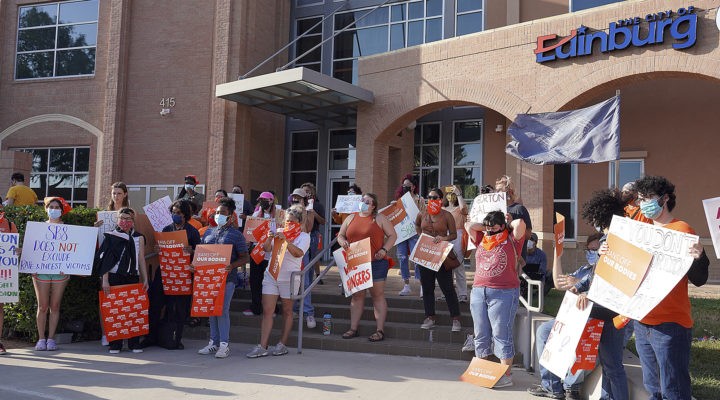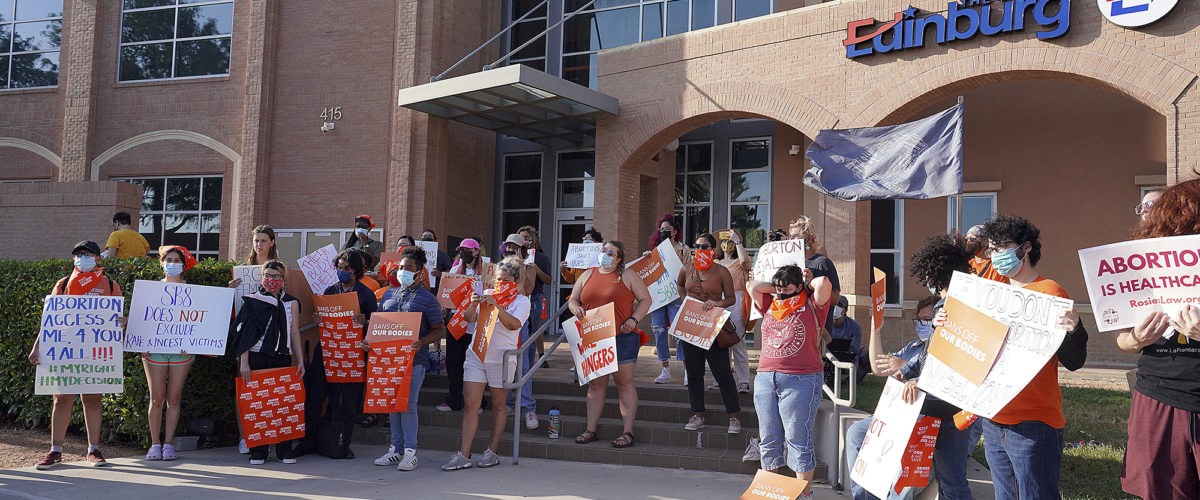After initially remaining silent as a highly restrictive new abortion law went into effect in Texas, the U.S. Supreme Court issued a late-night ruling, 5-4, Sept. 1 letting the controversial law stand — for now.
Had Justice Ruth Bader Ginsburg not died and been replaced in the last days of the Trump administration by Amy Coney Barrett, the outcome of this case likely would have been 5-4 the other direction. This ruling signals the first clear indication of where the new Trump-appointed conservative majority on the court will go on abortion cases.
Chief Justice John Roberts sided with the court’s three remaining liberals to oppose the majority opinion and wrote one of four dissents published by the court. He explained: “Although the court denies the applicants’ request for emergency relief today, the court’s order is emphatic in making clear that it cannot be understood as sustaining the constitutionality of the law at issue.”
Meanwhile, Justice Sonia Sotomayor, joined by Justice Stephen Breyer and Justice Elena Kagan, wrote her own blistering dissent to the majority opinion.
“A majority of justices have opted to bury their heads in the sand.”
“The court’s order is stunning,” she declared. “Presented with an application to enjoin a flagrantly unconstitutional law engineered to prohibit women from exercising their constitutional rights and evade judicial scrutiny, a majority of justices have opted to bury their heads in the sand. Last night, the court silently acquiesced in a state’s enactment of a law that flouts nearly 50 years of federal precedents. Today, the court belatedly explains that it declined to grant relief because of procedural complexities of the state’s own invention. Because the court’s failure to act rewards tactics designed to avoid judicial review and inflicts significant harm on the applicants and on women seeking abortions in Texas, I dissent.”
On the other hand, the Roberts’ dissent did not portend a ringing endorsement of the Texas law, even suggesting that it is likely to be found unenforceable. But in the moment, opponents of the new law have not sufficiently demonstrated that they could win at trial on the merits of their arguments, he explained.
“The applicants now before us have raised serious questions regarding the constitutionality of the Texas law at issue. But their application also presents complex and novel antecedent procedural questions on which they have not carried their burden,” it stated.
Roberts then adds: “In reaching this conclusion, we stress that we do not purport to resolve definitively any jurisdictional or substantive claim in the applicants’ lawsuit. In particular, this order is not based on any conclusion about the constitutionality of Texas’s law, and in no way limits other procedurally proper challenges to the Texas law, including in Texas state courts.”
The set of four written opinions issuing from the case seem to agree on one thing: This Texas law is likely to appear before the full court in the future as it is challenged.
The set of four written opinions issuing from the case seem to agree on one thing: This Texas law is likely to appear before the full court in the future as it is challenged.
In the meantime, those likely to be caught in the crosshairs in Texas could include not only doctors and medical personnel, but also clergy, counselors and social workers. That’s because the so-called “fetal heartbeat” bill passed by the Texas Legislature takes a novel approach by deputizing ordinary citizens to report anyone they suspect of assisting in any way with a woman’s procurement of an abortion.
The law not only deputizes, it also incentivizes reporting people. Those who successfully report accomplices to an abortion could receive $10,000 rewards from the state. And those found to be in violation could be fined up to $10,000.
A social worker’s concern
Monica Faulkner is among the Texans already filing suit against the state because of the new law. Nexstar Media reported that she’s a social worker concerned how the law could affect her when she helps victims of sexual assault or abuse.
“I’ve been a social worker for 20 years now. I’ve worked with sexual assault survivors throughout my career in various capacities. And it just is absurd to me to think that my work with survivors would cost me $10,000,” Faulkner told the news service. “Talking with a sexual assault survivor means providing them all the information and answering all their questions, because they’ve had so much power taken from them, that my job in my role is to give them information and to listen to them and to process that information.”
The Texas law makes no exceptions for rape or incest or other forms of abusive impregnation.
The Texas law makes no exceptions for rape or incest or other forms of abusive impregnation.
A pastor’s concern
Daniel Kanter, senior minister at First Unitarian Church in Dallas, told Rolling Stone he fears clergy could be targeted under the law for counseling someone who is considering terminating a pregnancy. He was among a group of doctors, clinics and clergy who unsuccessfully attempted to stop the new law from going into effect.

Daniel Kanter
“I’ve been in so many types of conversations about abortion,” he told the magazine. “Many of them have been about whether or not to have the procedure. Some of them had been with anti-abortion advocates who needed the procedure for medical reasons. I’ve talked with families who decided to have abortions and many who have decided not to have abortions. When they leave my office, they make their own decisions with my support and with my love. The thing to realize here is that the consequences of this law not only leave us with thousands of undesired, difficult pregnancies, it also leaves us with few options about what we can do to support decision making.”
The bottom line, he said, is that this is an attempt by the state “to interfere with my ability to be fully present to all the people who need a private conversation with a faith leader.”
Last-minute challenge unmet
Considered perhaps the strictest anti-abortion law on the books in any state, the new Texas code outlaws any abortion procedure after a fetal “heartbeat” is detectable, which can be as early as six weeks into a pregnancy. That’s often before women know they are pregnant.
Critics of the law say the very term fetal “heartbeat” is misleading because embryos don’t possess a “heart” at that developmental stage.
Before the Sept. 1 date on which this and scores of other bills passed in this year’s Texas Legislative session were to take effect, a group of abortion providers sued to stop the ban’s implementation. Then just days before the deadline, the objectors asked the U.S. Supreme Court to delay implementation of the law, saying it would harm millions of women.
The Supreme Court initially took no action, which allowed the Texas law to take effect, and then issued its 5-4 ruling at midnight that day.
Getting around Roe v. Wade
What’s different with the Texas law compared to previous attempts by states — including Texas — to make abortion impossible is the enforcement mechanism.
The language is so broad that the law could cast a wide net to accuse clergy, social workers, doctors, nurses, drivers, friends, donors, even good Samaritans of somehow aiding and abetting an abortion. But the state itself will not enforce the law.
Supporters of the law believe its unique enforcement mechanism could become a model for other Republican-led states, effectively nullifying Roe v. Wade without the Supreme Court having to reverse it.
Instead, private citizens would enforce it by being allowed to file suit against anyone they believe has made an abortion happen. That difference, the bill’s supporters believe, will allow the law to avoid conflict with the 1973 Supreme Court decision legalizing abortion nationwide.
Supporters of the law believe its unique enforcement mechanism could become a model for other Republican-led states, effectively nullifying Roe v. Wade without the Supreme Court having to reverse it.
And anti-abortion advocates are armed and ready to use the new law’s reporting mechanism.
John Seago, legislative director for Texas Right to Life, said his organization has set up a whistleblower website, where anyone can file anonymous tips about now-illegal abortions.
But this isn’t as bad as it might sound, Seago told NPR. “These lawsuits are not against the women. The lawsuits would be against the individuals making money off of the abortion, the abortion industry itself. So this is not spy on your neighbor and see if they’re having an abortion.”
The coalition of abortion providers and allies challenging the new law in federal court sees it differently, arguing that the law “places a bounty on people who provide or aid abortions, inviting random strangers to sue them.”
Praise and condemnation for the law
On the first day of the new Texas law, supporters and opponents offered statements either praising or condemning the new reality.
“Today is historic for law and life. The Texas Heartbeat Act is the first ever law of its type to go into effect,” said Jonathan Saenz, president of Texas Values. “Starting today, babies and mothers will be spared from an abortion in Texas when a baby’s heartbeat is detected. God bless Texas and courageous leaders like Sen. Bryan Hughes, Rep. Shelby Slawson, Lt. Gov. Dan Patrick, Gov. Greg Abbott, Attorney General Ken Paxton and his team, and thousands of pro-life supporters for making this day possible.”
Texas Right to Life used the occasion to fundraise for its advocacy work and to blast Democrats in Washington.
Texas Right to Life used the occasion to fundraise for its advocacy work and to blast Democrats in Washington.
“Leftists are FURIOUS over the Texas Heartbeat Act,” the group’s website proclaimed. “The life-saving law took effect September 1 and will remain in force unless the U.S. Supreme Court blocks the policy. High-ranking officials, including Nancy Pelosi, Joe Biden, and Kamala Harris, took to Twitter to blast our work to protect babies.”
On the other side, Julie F. Kay, co-author of Controlling Women: What We Must Do Now to Save Reproductive Freedom, issued a blistering statement about the national effects of the Texas law: “Texas has launched a nuclear missile at Roe and Casey because it knew the Supreme Court would welcome such attacks; however, women know this is a violation of their human rights by disregarding their autonomy and undermining their ability to control their lives and sexuality. To fix this, we need to stop beating our heads against the Supreme Court’s marble walls and take our voices to the streets and legislatures to demand our full human rights.”
Rachel Laser, president of Americans United for Separation of Church and State, tied what’s happened in Texas to a larger context of religious liberty.
“Abortion bans are the result of the crumbling of church-state separation,” she said. “The First Amendment prohibits the government from imposing one set of religious beliefs on others, but Texas’ new draconian law and other attempts by states to ban reproductive freedom do just that. Blocking abortion access is just one item on the Christian nationalist agenda that religious extremists and their lawmaker allies are pushing, to force all of us to live by their beliefs. Abortion bans particularly harm more marginalized communities, including women, Black people, low-income communities, immigrants, LGBTQ folks, young people, indigenous people and other communities of color.”
Related articles:
SBC calls for ‘immediate abolition of abortion without exception or compromise’
When being ‘pro-life’ really isn’t: How I became a Democrat who opposes abortion | Analysis by Chris Conley
Southern Baptists join Catholic bishops in asserting ‘no Constitutional basis’ for abortion at all | Analysis by Mark Wingfield


